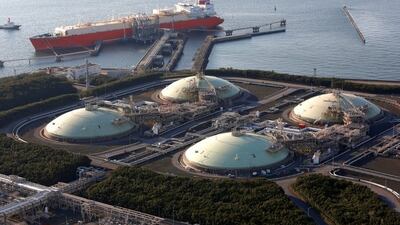A ruling by Japan’s trade regulator against resale restrictions on liquefied natural gas (LNG) shipments will have widespread implications for booming seaborne gas trade, mostly in favour of buyers.
The Japan Fair Trade Commission (JFTC) on Wednesday concluded a long study of LNG trade with a ruling that contracts should no longer have restrictions on the resale by buyers of cargoes once they have taken title.
The move echoes a decision taken by the European Union in the early part of this century but will affect the region that is home to the world's largest LNG markets – Japan and South Korea – and its fastest-growing ones, especially China.
“Certainly this ruling means the balance of power in the LNG market has moved from seller very strongly to the buyer,” said Kelly Anne Shanks, the head of Asian LNG research at consultancy Wood Mackenzie.
Japan, the world’s largest importer of LNG, began to study the market last spring with the aim of bringing more flexibility to the market, especially given that a huge wave of new supply from projects in northern Australian, Papua New Guinea and elsewhere had changed the landscape and loosened the grip of the dominant supplier, Qatar.
The new ruling is part of a broader trend whereby buyers have been able to negotiate more flexible terms in contracts, as well as the development of a spot market in LNG.
“The market was already moving in this direction and new contracts in general have become a lot more flexible,” said Emma Richards, senior oil and gas analyst at BMI Research. “But the JFTC ruling certainly accelerates that process.”
Japan’s move is likely to be followed by other large Asian markets.
“Where Japan leads others follow,” said Ms. Shanks. “Other big importers – South Korea, China, India – probably will be looking very closely at the decision and won’t want to accept worse terms than Japan is getting.”
Global LNG trade has been on a long upswing and hit a record 258 million tonnes last year, up 5 per cent on the year before, according to the International Gas Union, a trade body.
While Japan’s growth has been levelling off and is expected to continue to do so as it reintroduces nuclear power that was shut down after the Fukushima disaster, markets including China, India, and Pakistan added a combined 13 million tonnes last year.
South Korea’s LNG demand also has been reaching a plateau, but the new energy policy set out by the president Moon Jae-In emphasises gas growth for the future at the expense of coal and nuclear.
While the Japan ruling gives buyers more flexibility, it is good news for the market in general in that it fosters its growth and ultimately will also benefit suppliers, once demand catches up with supply.
“The ruling is likely to bolster trading activities and assist the development of trading hubs in the region,” said Eugene Lindell, an analyst at JBC Energy in Vienna.
“Basically we're looking at a more fluid trade in LNG, which on the whole is a good thing,” said Ms Richards. “But it does mean you're likely to see more spot cargoes coming available at a time when the market is already loosening. So, bearish for prices.”
The UAE is a net importer of gas but also exports LNG and has ambitions for large-scale gas exploitation – especially its onshore and offshore sour gas fields – as well as to develop as a regional trading hub and to take advantage of the growing LNG ship bunker fuel market.

